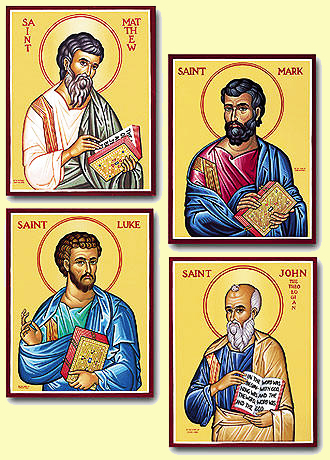Brian2
Veteran Member
The authors of the Gospels were thus more concerned with gathering a collection of their communities’ teachings and organizing them into a cohesive narrative, similar to the anonymous, third person narratives found in the Old Testament. As Armin Baum (“The Anonymity of the New Testament History Books,” p. 142) explains, “The anonymity of the Gospels is thus rooted in a deep conviction concerning the ultimate priority of their subject matter.” This is not at all the case for Tacitus. We might be suspicious of the authorial attribution (at least to the extent that the Histories can be considered Tacitus’ own version of events), if Tacitus had merely copied from 80% of the material of an earlier author (as the Gospel of Matthew did) in order to write a highly anonymous narrative. Instead, Tacitus wrote in a unique Latin style that distinguished him as an individual, personal author, and he likewise comments on the events within his narrative from his own personal point of view.
The continuation of the OT anonymous authorship might be a reason for anonymity. It does not mean that the early Church did not know who wrote them however and it does not mean that the skeptic presumption of no true prophecies and so written after 70AD is true either.
We have seen above that the internal evidence does not support Matthew, Mark, or John as the authors of the gospels attributed to them. What about Luke? The Gospel of Luke and Acts are attributed to Luke, the traveling attendant of Paul. This is all very interesting, since we possess 7 undisputed epistles of the apostle Paul in the New Testament (6 of the traditional letters of Paul—Ephesians, Colossians, 2 Thessalonians, 1 and 2 Timothy, and Titus—are of disputed authorship and are possibly forgeries, as explained by Ehrman in Forged: Writing in the Name of God.)
Ehrman is extreme in his views about the authorship of the various books and epistles as far as I know. He is recognized as a good scholar but much of his opinions are disputed.
If Luke was Paul’s attendant, then corroborating details between Acts and the Pauline epistles may support the claim that Luke authored Acts; however, scholars often find the opposite to be the case.[17] To name a few discrepancies:
In light of these and other discrepancies between Paul’s own recollections and how he is depicted in Acts, many scholars agree that the author of Luke-Acts was probably not an attendant of Paul (the speculation that he was is based largely on the ambiguous use of the first person plural in a few sections of Acts, to be addressed below). Nevertheless, the author of Luke-Acts clearly had a strong interest in Paul. However, the Oxford Annotated Bible (p. 1919) points out that the author “was probably someone from the Pauline mission area who, a generation or so after Paul, addressed issues facing Christians who found themselves in circumstances different from those addressed by Paul himself.” Hence, we once more have an anonymous author who was distanced from the various traditions and stories that he later compiled as a non-eyewitness.
- In Acts 9:26-28, Paul travels from Damascus to Jerusalem only “days” (Acts 9:19; 9:23) after his conversion in Acts 9:3-8, where Barnabas introduces him to the other apostles. However, in his own writings (Galatians 1:16-19), Paul states that he “did not consult any human of flesh and blood” after his conversion (despite consulting Ananias and preaching in the synagogues of Damascus after his conversion in Acts 9:17-22), but instead traveled into Arabia (which Acts makes no mention of), and did not travel to Jerusalem until “three years” after the event, where he only met Peter and James.[18]
- In Acts 16:1-3, Paul has a disciple named Timothy, who was born from a Greek father, be circumcised “due to the Jews who lived in that area.” However, this goes against Paul’s own deceleration (Galatians 2:7) “of ministering the gospel to the uncircumcised.” Likewise, in Galatians 2:1-3, Paul brings another Gentile disciple, Titus, to the Jewish community in Jerusalem, but particularly insists that Titus not be circumcised.[19] Likewise, in 1 Corinthians 7:20, Paul states regarding circumcision, “Each should remain in the condition in which they were called to God.”
- In Galatians 2:6, Paul makes it clear that his authority is equal to the original apostles, stating, “Of whatever sort they were makes no difference to me; God does not show partiality—their opinions added nothing to my message.” However, in Acts 13:31, Paul grants higher authority to those who originally “witnessed” Jesus. Likewise, Acts 1:21 restricts the status of “apostle” to those who had originally been with Jesus during his ministry, despite Paul’s repeated insistence that he was an apostle within his own letters (1 Corinthians 9:1-2).
1) Acts 9:26 says 26 When he came to Jerusalem, he tried to join the disciples, but they were all afraid of him, not believing that he really was a disciple. 27 But Barnabas took him and brought him to the apostles.
It does not say how long it was before he came to Jerusalem (could have been years) and does not say how many apostles he spoke to (could have been only 2). Also "did not consult any human of flesh and blood" is referring to not consulting people about what the gospel was,,,,,,,,,,, iow it does not mean that he did not speak to people or even speak to Christians.
2)Considering Acts 16:1-3 and Gal 2:1-3,7. It is interesting that there is no evidence of pre Mishnaic Jews believing that a child of mixed marriage followed what the mother was.
Nevertheless that does not mean Timothy was or was not considered a Jew and Paul seemed to want to have Timothy circumcised so that Timothy would come with Paul on his journeys and help preach the gospel among Jews at times and he would not have been able to do that as an uncircumcised gentile.
Paul did not force Titus to be circumcised and I suppose Titus was not working with Paul among the Jews. When Paul took Titus a Gentile to Jerusalem it was to other Christians where separate should not happen but which some Jewish Christians were still doing from gentiles (see Gal 2:11-14)
It is interesting that when Paul met Timothy, Paul was taking the message about circumcision and obeying the Law of Moses to the churches (Acts 15, Acts 16:4), so we can easily see why Paul wanted Timothy to be circumcised and it stands the test of the epistles to Timothy being to a young leader, which Paul seemed to have in mind for Timothy.
3) There are many other than Paul and the original 12 who are called apostles in the New Testament.
Acts 13:31 and Acts 1:21 do not say anything about apostles.
Acts 13:31 and for many days he was seen by those who had traveled with him from Galilee to Jerusalem. They are now his witnesses to our people.
Actually Paul did witness Jesus and it is agreed by Peter that he was to take the gospel to the gentiles.
So we see there is no discrepancy in what Luke says in Acts and what Paul says, so that way of showing that Luke was not with Paul is no good.
Luke who wrote the gospel of Luke and Acts was with Paul on his journeys and could died with Paul when Paul went to Rome at the end of Acts.
Certainly he did not record the death of Paul in Acts or what happened with Paul.
So Paul and Luke probably died in the persecution under Nero (64AD) and so the gospel of Luke and Acts were written before then, with the gospel being written first. And if Luke copied Mark, then Mark was written before Luke.
Last edited:



